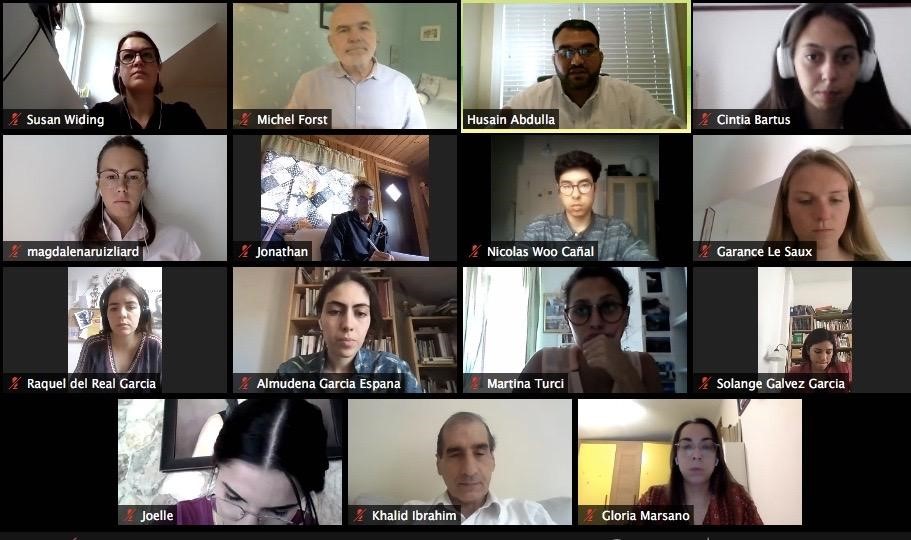Today, an online side event with the title No prosperous future or sustainable peace in Bahrain without the protection of Human Rights Defenders was held during the 44th session of the United Nations Human Rights Council (UNHCR). The event highlighted the ongoing and systemic abuses of human rights defenders (HRDs) and political prisoners in Bahrain.
The four speakers were as follows:
- Husain Abdullah, Executive Director of ADHRB
- Preethi Nallu, Journalist, and Advocacy Consultant at (IMS)
- Michel Forst, Former UN Special Rapporteur on the situation of human rights defenders
- Susan Wilding, Head of Geneva Office, CIVICUS
Husain Abdullah began his talk by celebrating the release of Bahraini human rights activist Nabeel Rajab. However, Husain spoke of the importance of putting Nabeel’s release into perspective regarding the broader fight for human rights in Bahrain. Husain highlighted that, although this is a positive step in the fight for human rights in Bahrain, the international community and NGOs must maintain the pressure on the government to release all political prisoners in Bahrain. Another important point mentioned by Husain was that the government of Bahrain has ramped up their whitewashing campaign to try and cover up the injustices that continue to happen on a daily basis. Nabeel Rajab’s release is not a consequence of the Bahraini regime deciding to turn a new leaf, rather it is due to a coordinated and consistent campaign of foreign advocacy by international organizations such as the European Parliament and NGOs. Lastly, Husain echoed the need for rehabilitation for the victims of repression, and of torture in the kingdom.
Michel Forst highlighted that during his time as UN Special Rapporteur on the situation of human rights defenders he struggled to be granted access to Bahrain, and that despite being supported in his aim to visit the country from both inside and outside the ckingdom, the government blocked him from entering the country. Forst stressed the fact that many HRDs remain imprisoned in Bahrain as prisoners of conscience and recommended that the international community must continue to show solidarity with HRDs while ensuring that pressure against the regime does not lighten. Bahrain must accept these recommendations as this will help to improve the social and economic welfare of the country. Furthermore, Forst highlighted the importance of events that aim to raise awareness of the situation in Bahrain. Finally, Forst called on private companies that have business ties with Bahrain to hold the government to account by complying with the highest standards designed to protect human rights.
Preethi Nallu spoke about the plight of journalists in Bahrain, both locally and internationally. Bahrain has a long and infamous record of incarcerating journalists. Bahraini press and media laws are intentionally vague in wording, which enables the government to detain and arrest journalists on terrorism charges by painting any critical coverage of the regime as a threat to national security or treason. Nallu highlighted that new cyber laws are designed to be incredibly restrictive, and that there have been dozens detained and arrested for exercising their right to free speech online. The government has invested heavily in pro-regime news media, which is used as a propaganda tool for the regime. Further, the government has used PR moves to try and sweep other violations of human rights under the rug. An example for this is a decision taken by the Bahraini regime to release numerous prisoners in March, when countries worldwide went into lockdown due to the progressing of the COVID-19 pandemic and thus focused their efforts on domestic issues. However, opposition leaders, activists, journalists and HRDs, who suffer from serious health issues and are thus more at risk of contracting COVID-19, were not affected by this decision and remain in prison. The government is therefore sending out a message to political defenders speaking out against the government that they will show no mercy for them. Nallu spoke about how these issues were important and that they must be brought to attention to the world.
Susan Wilding called on the Bahraini government to:
- Review laws that restrict fundamental freedoms;
- Allow NGOs, UN representatives and working groups and journalists to visit Bahrain and document the systematic abuse; and
- Free all HRDs and prisoners of conscience.
She also echoed the remarks made by Husain Abdullah and mentioned that the current COVID-19 pandemic led to the Bahraini government increasing restrictions on freedom of expression in order to prevent criticism on the domestic strategy to fight the pandemic to be voiced.
The speakers were then asked questions by the audience on a broad range of topics regarding human rights, and in their responses highlighted the systemic issue faced by HRDs in Bahrain.





